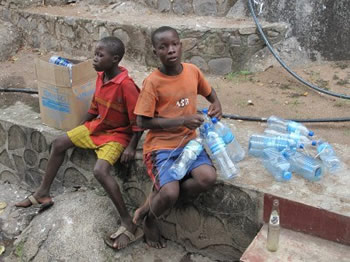Time to say “for every child in Ghana, let’s be fair”
 Walk past any school yard with a group of children playing their favourite game, and it won’t be long before you hear the phrase, “It’s not fair! It’s not fair!”
Walk past any school yard with a group of children playing their favourite game, and it won’t be long before you hear the phrase, “It’s not fair! It’s not fair!”
As adults, we hardly say this. Not because we see less injustice as we grow up, rather society teaches us to become more accepting of the fact that sometimes life is just not fair. The issue though, is that if we do not call out unfairness for what it is, we begin to tolerate it. Worrying, as unfairness – or inequity – can also have a lasting detrimental impact not just on one person but on the community and society at large.
Unfortunately, the landscape is not equitable for children across Ghana. Let’s take the example of six-year-old twins Ata and Ataa. Ata is given ten mangoes to eat while Akosua is given two. Is this fair? Of course not. So what if we were not talking about mangoes, but about the number of times they are taken to the clinic when sick, or going to school? Say, then, on the day Ata and Ataa are at the right age to be enrolled into Primary One Ata istaken to the school and attends every day. Ataa meanwhile is told her time will come and stays home to help with chores instead. Fair?
Unfortunately, this scenario is a reality for too many children across Ghana. Currently 90 percent of boys and girls are enrolled in primary level. This means 10 percent of children – that’s one child in every ten – is not in primary school. This is a significant proportion of children denied the chance to reach their fullest potential. And that is not fair.
What if within that 10 percent of unschooled there was a child with the talent and ability to become one of Ghana’s most skilled surgeons competing with the likes of Prof. Kwabena Frimpong-Boateng? Or the next Secretary General of the United Nations like HE. Kofi Annan? Turning a blind eye to these inequities does not just disadvantage the child who’s not able to get to school, it also obstructs substantial progress of the whole country.
It is not just education where we see these disparities. So far not every child has access to good sanitation, in the form of household or school toilet facilities. Every child does not have easy access to adequate healthcare and not all mothers are given a chance to fully understand the benefits of feeding girls and boys well from birth.
How fair is it that a child born to a family in Accra can have up to 100 times as much an opportunity as a child born in Wa? Surely it should be that wherever a child lives in Ghana, she or he has a fair chance of achieving the same opportunities.
This imbalance of a fair chance for every child does not impact just the child, it can also affect the country’s entire economy. The economic costs of such inequity can be dramatic. Recent global data indicates that increasing a country’s average years of schooling by just one year can result in an 18 per cent increase in GDP per capita. Opinion-Editorial UNICEF Ghana May 2017.
Because a child’s gender, family income, region where he is born and her ability or disability can play a significant role in determining the outcome in life, we need to level up the playing field. The starting line cannot be the same for everyone. But substantial change can be achieved if the most disadvantaged are empowered to realise their own potential.
By investing more in education and implementing more equitable policies, we can reverse current trends in which the poorest and most marginalized miss out.
So, similar to children in a school yard, it’s time for us to start calling out unfairness. Together, we can say, ‘Let’s be fair. Let’s give every child in Ghana a chance to succeed.’
Let’s Be Fair, let’s even up the odds, so that every child has a chance to fully thrive and realise their fullest potential. If we do, who knows what the landscape could be for Ghana’s next 60 years.
By Susan Namondo Ngongi,
UNICEF Ghana Representative
